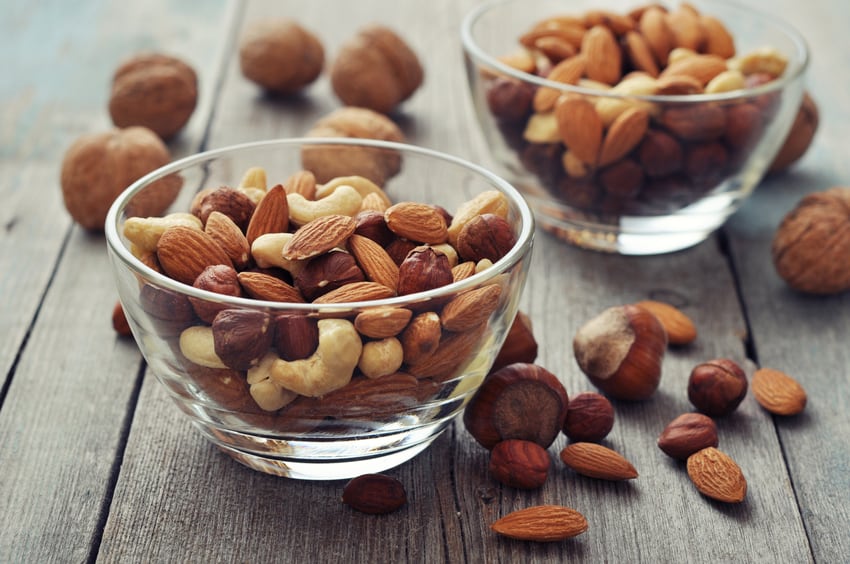“The current guidelines don’t have these recommendations,” Jordi Júlvez, the study’s coordinator told FoodNavigator. “It would be good if it were recommended that pregnant women should eat a small handful of raw nuts three times a week during their whole pregnancy. That would be my recommendation, but of course we need other studies to confirm the findings as this was the first of its kind.”
The study from by the Barcelona Institute for Global Health concluded that nut intake during pregnancy boosts child’s “attention capacity and long-term working memory”.
Júlvez said the results could have big implications for the food industry and he will now apply for European funding to do an intervention.
“Walnuts have omega 3 which is good for brain development. Pharmacies are currently giving DHA omega 3 to pregnant women in pill form but it now may be better to use nuts,” he said. “This is a new field now to be opened… to focus on empowering brain development, not just to cure diseases.”
Better cognitive function
Increasing numbers of consumers are attracted to the health benefits associated with nuts, with greater numbers adding nuts to salads or including them in granola for breakfast.
There is scientific evidence on the protective effects of nut intake against cognitive decline in the elderly, and studies also suggest a handful of nuts a day can boost male fertility.
However, this effect has been less explored in child neurodevelopment and no studies up to now have explored the potential longitudinal association with nut intake during pregnancy.
Júlvez’s study looked at over 2,200 mother and child pairs in four parts of Spain. The mothers were questioned on their nut intake and eating habits during the first and last trimester of their pregnancy. The children’s neuropsychological development was assessed using several internationally validated standard tests 18 months, five years, and eight years after birth.
Analysis of the results showed that the group of children whose mothers ate more nuts during the first trimester of pregnancy obtained the best results in all the tests measuring cognitive function, attention capacity and working memory.
“This is the first study to explore the possible benefits of eating nuts during pregnancy for the child’s neuropsychological development in the long term. The brain undergoes a series of complex processes during gestation and this means that maternal nutrition is a determining factor in fetal brain development and can have long-term effects,” said Florence Gignac, another author of the research.
The study included raw walnuts, almonds, peanuts, pine nuts and hazelnuts. Factors such as maternal education, social class, body mass index, energy intake, fish intake, omega-3 supplements, alcohol consumption and smoking habits during pregnancy were controlled.
“We think that the beneficial effects observed might be due to the fact that the nuts provided high levels of folic acid and, in particular, essential fatty acids like omega-3 and omega-6. These components tend to accumulate in neural tissue, particularly in the frontal areas of the brain, which influence memory and executive functions,” said Gignac.
Europe’s nut market is coming out of its shell
- Most Europeans think that nuts are good source of healthy fats.
- 39% of Spanish consumers prefer to choose healthier variants (e.g. low fat, low salt) when buying crisps, nuts and salty snacks.
- Most European consumers say that nuts are one of their preferred source of ‘non-traditional’ protein (55% of French, 64% of Germans).
Source: Mintel’s Global New Products Database
The benefits could be even greater
The researchers said that the benefits described in the study were seen in the group of mothers who reported the highest consumption of nuts – a weekly average of just under three 30g servings, which was slightly lower than the average weekly consumption recommended in the healthy eating guide published by the Spanish Society of Community Nutrition.
“This makes us think that if the mothers consumed the recommended weekly average the benefits could be much greater,” Gignac said.
No associations during the third trimester of pregnancy
The study also analysed the mothers’ nut consumption during the third trimester of their pregnancy, but in this case either no associations were observed with the neuropsychological outcomes or the associations found were weaker. “This is not the first time we have observed more marked effects when an exposure occurs at a specific stage of the pregnancy. While our study does not explain the causes of the difference between the first and third trimesters, the scientific literature speculates that the rhythm of fetal development varies throughout the pregnancy and that there are periods when development is particularly sensitive to maternal diet,” explained Jordi Júlvez, an author of the study.
The researchers said future cohort studies and randomised clinical trials were needed to confirm this association pattern in order to further extend nutrition guidelines among pregnant women.
Source
‘Maternal Nut Consumption During Pregnancy Linked to Improvements in Neurodevelopment in Children’
European Journal of Epidemiology
DOI: https://link.springer.com/article/10.1007%2Fs10654-019-00521-6



